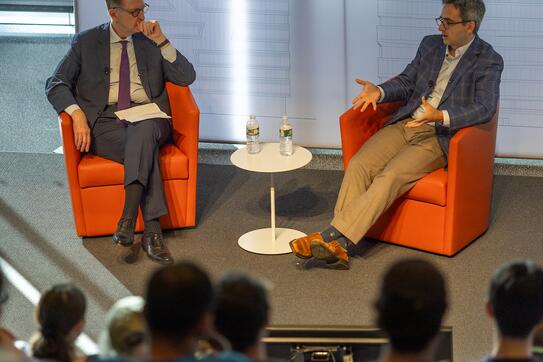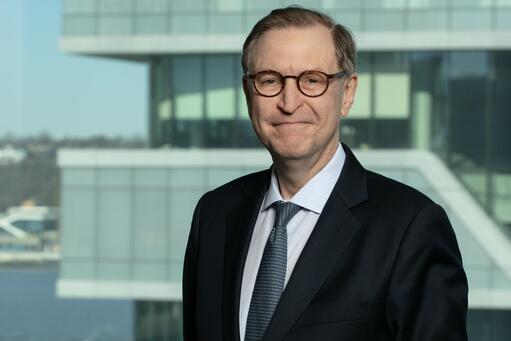Hundreds of students graduating from prestigious business schools every year will go on to run global companies, economies, and even countries. As part of their education, significant swathes of those graduates will have studied the theories of modern political economists like Adam Smith, David Ricardo, and other proponents of classical liberalism, as well as champions of the neoliberal school, like Friedrich Hayek and Milton Friedman.
But as the fabric of the world around us perpetually shifts, and as unprecedented innovations, developments, and other dynamics influence the way we live, work, and interact with one another, it's perhaps never been more important to ask ourselves a central question: How relevant to our world today are the foundational economic theories that have—in some cases, for centuries—served as the parameters of business and society? And more overarchingly, is capitalism, as we know it, working?
In mid-September, Oren Cass, founder and executive director of American Compass, joined Glenn Hubbard, dean emeritus and the Russell L. Carson Professor of Finance and Economics, to tackle precisely these questions. Hosted in Columbia Business School's Geffen Hall as part of a speaker series on the future of capitalism, sponsored by The Hub think tank, the discussion covered a host of topics—from flawed labor markets to US trade relations with China. But Cass's thesis was clear: “Capitalism is not working for the typical American,” he argued. And it has to be fixed.
The Jobs Mismatch
In 2018, Cass, whose credentials include working on Senator Mitt Romney's presidential campaigns, published his book, The Once and Future Worker: A Vision for the Renewal of Work in America, in which he argues that the American worker is in crisis.
Wages have stagnated, and an unsustainable reliance on welfare programs has proliferated, he says. Further, life expectancy is declining and substance abuse and obesity rates are rising. But it doesn't have to be this way, Cass adds, noting that these trends are a direct consequence of a system that has encouraged increasing consumption at the expense of the well-being of American workers and the communities in which they live.
Cass writes that Donald Trump's presidency shone a spotlight on what was wrong. But while both the right and the left ends of the political spectrum agree that something's gone awry, neither side's proposed response will prevent us from repeating the mistakes we've made in the past, he argues, meaning the solution needs to be much more radical.
“The secret sauce of capitalism, when it works, is when you put capital and labor in a room together and figure out how they work together,” Cass said in his conversation with Hubbard. “That mutual dependency is at the heart of what has worked for capitalism.” But, he added, “what we have today is a total disaggregation of those two things.”
Recalibrating that demand and supply, Cass said, is the only way to create more of what he describes as “good jobs,” and it's also a surefire way of restoring “foundational productivity” in sectors that are so critical to the efficient functioning of America's economy and society—like manufacturing.
A Tariff to Rebalance
Beyond the gaping skills gap, other things need to change for a model of efficient capitalism to be able to thrive. One thing Cass took aim at is the US trade deficit.
“As Warren Buffett says, the trade deficit means we're effectively mortgaging our future,” he explained. What he means by that, Cass said, is that Americans are paying for goods and services that are produced abroad by sending assets to other countries, including ownership of US corporations, real estate, and bonds, for example.
Also, other nations aren't increasing the volume of goods and services they buy from the United States as quickly as US consumers have ramped up their own purchasing and consumption of goods from other countries, he noted.
Sure, Cass said, the ideas of Smith and Ricardo are relevant and applicable in a theoretical economy, but not in a world of such huge global imbalances, geopolitical tensions, and ideologically opposed state governments.
One approach Cass recommends to incentivize a reduction in the US trade deficit, which in turn would alleviate the burden the deficit is placing on average Americans, is a global tariff. The way he envisions such a tariff working most effectively is if it “ratchets up relative to the size of the trade deficits.”
Initially, a uniform global tariff on all imports should be set at 10 percent, Cass said. It would then be adjusted automatically each year based on the scale of the trade deficit.
As for Hubbard, in an ideal world, what policy measure would he first implement to ensure that capitalism fulfills its goal of maximizing welfare for all? “Much more government focus on opportunity,” he said. And there needs to be a great emphasis on education, he added.
“Protectionist voices are as loud as they are because we have failed,” Hubbard said. “Overall, we need to demand a lot more of capitalism.”
Learn more about The Hub at Columbia Business School.


